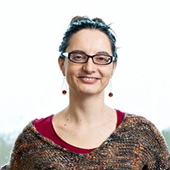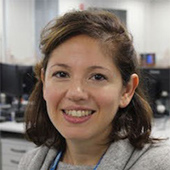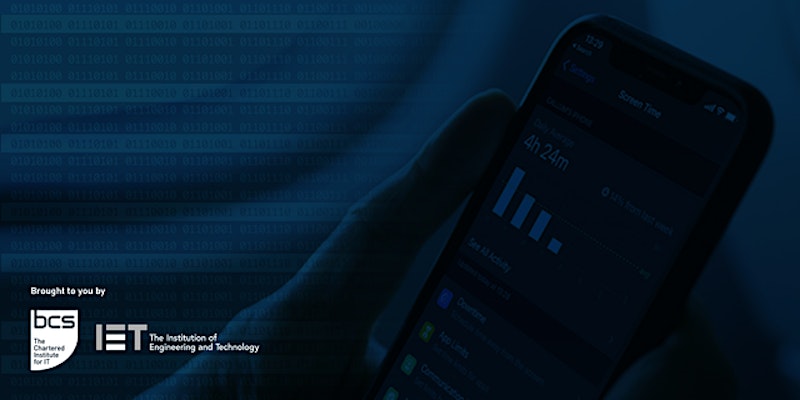Join us for our first virtual Turing Talk, in partnership with the IET.
Speakers
- Headline speaker: Cecilia Mascolo, Full Professor of Mobile Systems in the Department of Computer Science and Technology, University of Cambridge, UK.
- Insights speaker: Kate (Katayoun) Farrahi, Assistant Professor in the ECS department at the University of Southampton, working in the vision, learning and control VLC Group.
Synopsis
Headline talk - Sounding out wearable and audio data for health diagnostics
What can data from devices we carry with us in our daily activities really reveal about our health and wellbeing? Considerable research has been conducted into mobile and wearable systems for human health monitoring.
This concentrates on either devising sensing and systems techniques to effectively and efficiently collect data about users, and patients or in studying mechanisms to analyse the data coming from these systems accurately. In both cases, these efforts raise important technical as well as ethical issues.
In this talk, I plan to reflect on the challenges and opportunities that mobile and wearable health systems are introducing for the community, the developers as well as the users. I will use examples from my group's ongoing research on exploring machine learning and data analysis for health application in collaboration with epidemiologists and clinicians.
In particular I will discuss our project on using audio signals for disease diagnostics and our recent work in the context of COVID-19: a crowdsourced collected through mobile apps (covid-19-sounds.org) of respiratory sounds (coughs, breathing and voice) to pre-screen and diagnose COVID-19.
Insights talk - Wearable technology for digital epidemiology
Wearable technology is transforming into a viable healthcare tool. This technology can monitor humans continuously and often ubiquitously, providing a method for improved health insight and individualised care. Fitness trackers, smart watches, biosensors are all forms of wearable technology.
In this insight talk, I will also use the example of smartphones as wearable technology and delve into a case study of how this technology can be used in the battle against COVID-19. We are using smartphone technology to simulate digital epidemics, particularly focusing on contact tracing and the ability to evaluate snapshots of our efforts using real passively sensed data.
About the speakers
Cecilia Mascolo
 Cecilia is the mother of a teenage daughter but also a Full Professor of Mobile Systems in the Department of Computer Science and Technology, University of Cambridge, UK.
Cecilia is the mother of a teenage daughter but also a Full Professor of Mobile Systems in the Department of Computer Science and Technology, University of Cambridge, UK.
She is co-director of the Centre for Mobile, Wearable System and Augmented Intelligence and Deputy Head of Department for Research. She is also a Fellow of Jesus College Cambridge and the recipient of an ERC Advanced Research Grant. Prior to joining Cambridge in 2008, she was a faculty member in the Department of Computer Science at University College London. She holds a PhD from the University of Bologna.
Her research interests are in mobile systems and machine learning for mobile health. She has published in a number of top tier conferences and journals in the area and her investigator experience spans projects funded by Research Councils and industry. She has received numerous best paper awards and in 2016 was listed in “10 Women in Networking /Communications You Should Know”. She has served as steering, organizing and programme committee member of mobile and sensor systems, data science and machine learning conferences.
Kate (Katayoun) Farrahi
 Kate is an Assistant Professor in the ECS department at the University of Southampton working in the vision, learning and control VLC Group. The focus of her research is on machine learning, particularly deep learning, often applied to health-related applications.
Kate is an Assistant Professor in the ECS department at the University of Southampton working in the vision, learning and control VLC Group. The focus of her research is on machine learning, particularly deep learning, often applied to health-related applications.
She is interested in developing machine learning techniques to address novel sensor-driven healthcare problems. Current applications include cascade learning for transfer on medical images, digital epidemiology particularly in the context of contact tracing, generative approaches for x-ray computed tomography and more fundamental topics in machine learning including scattering networks and neural arithmetic units.
Prior to joining Southampton, Kate was a research assistant at Idiap Research Institute. She obtained her PhD in Computer Science from Swiss Federal Institute of Technology in Lausanne (EPFL).














